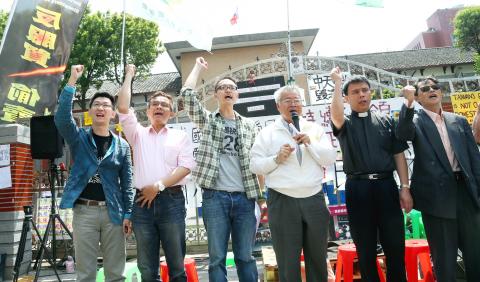National Taiwan University student Hung Chung-yen (洪崇晏) yesterday denied being the “mastermind” behind the demonstration outside the Zhongzheng First Police Precinct station on Friday, but showed his support for the cause by attending an event yesterday outside the Legislative Yuan in Taipei organized by groups seconding the Alliance of Referendum for Taiwan’s petition to make the plaza in front of the legislature a place where people can congregate.
The demonstration outside Taipei’s Zhongzheng First Police Precinct office was triggered by police’s forced eviction of protesters from the plaza — which the alliance had occupied since day one of the students’ seizure of the Legislative Yuan’s chamber — and its subsequent announcement that it had permanently revoked all assembly and parade permits for the group.
Hung yesterday said that he — like the other protesters — went to Friday’s event in response to a call circulating on the Internet earlier that day urging the public to “pass by” the police station.

Photo: Liu Hsin-de, Taipei Times
“If there was a mastermind of the protest, it would be President Ma [Ying-jeou’s, 馬英九] administration and those executive agencies who turned a blind eye to the public’s calls and expressions of dissent,” he said.
“I will not try to avoid any criminal charges I might be accused of for ‘violating’ the unconstitutional Assembly and Parade Act (集會遊行法). I want to show the ridiculousness of this ‘bad law,’” Hung added.
The clause of the act regarding the need to obtain authorities’ approval before staging a protest was ruled unconstitutional by the Council of Grand Justices earlier this year.
At yesterday’s rally, Anti-Nuclear Action Alliance convener Kao Cheng-yan (高成炎) criticized the legislature for failing to hold a scheduled floor meeting yesterday, making it impossible for it to receive the plaza petition.
“What was the point of chasing the students away from the occupied chamber so desperately then?” he asked.
Calling on the legislature to return the plaza to the people, he said that the Legislative Yuan’s front gate did not exist when the 520 Peasant movement broke out in 1988.
“In addition, I petitioned several times for the anti-nuclear cause in the 1990s on the front plaza without applying for a permit,” Kao said, adding that in 1999, the space was also used by hunger-strikers demanding the passage of a referendum act.
Taiwan Environmental Protection Union secretary-general Andy Tung (董建宏) said the space in front of the legislature’s building should be used to enable public participation, instead of muting people’s voices.
Hung also underlined the need for the public to keep demanding that the government probe the forced dispersion of alliance protesters.
“This case should not simply end with the police reinstating the alliance’s right to assembly,” he said, adding that someone has to be held accountable for the erroneous decision.
Rebuffing accusations that he harbors a grudge against the police, Hung said that he has supported the establishment of a police labor union since last year, when he took to the streets with officers’ families to call for better treatment of law enforcement personnel.

Chinese Nationalist Party (KMT) Chairman Eric Chu (朱立倫), spokeswoman Yang Chih-yu (楊智伃) and Legislator Hsieh Lung-chieh (謝龍介) would be summoned by police for questioning for leading an illegal assembly on Thursday evening last week, Minister of the Interior Liu Shyh-fang (劉世芳) said today. The three KMT officials led an assembly outside the Taipei City Prosecutors’ Office, a restricted area where public assembly is not allowed, protesting the questioning of several KMT staff and searches of KMT headquarters and offices in a recall petition forgery case. Chu, Yang and Hsieh are all suspected of contravening the Assembly and Parade Act (集會遊行法) by holding

PRAISE: Japanese visitor Takashi Kubota said the Taiwanese temple architecture images showcased in the AI Art Gallery were the most impressive displays he saw Taiwan does not have an official pavilion at the World Expo in Osaka, Japan, because of its diplomatic predicament, but the government-backed Tech World pavilion is drawing interest with its unique recreations of works by Taiwanese artists. The pavilion features an artificial intelligence (AI)-based art gallery showcasing works of famous Taiwanese artists from the Japanese colonial period using innovative technologies. Among its main simulated displays are Eastern gouache paintings by Chen Chin (陳進), Lin Yu-shan (林玉山) and Kuo Hsueh-hu (郭雪湖), who were the three young Taiwanese painters selected for the East Asian Painting exhibition in 1927. Gouache is a water-based

Taiwan would welcome the return of Honduras as a diplomatic ally if its next president decides to make such a move, Minister of Foreign Affairs Lin Chia-lung (林佳龍) said yesterday. “Of course, we would welcome Honduras if they want to restore diplomatic ties with Taiwan after their elections,” Lin said at a meeting of the legislature’s Foreign Affairs and National Defense Committee, when asked to comment on statements made by two of the three Honduran presidential candidates during the presidential campaign in the Central American country. Taiwan is paying close attention to the region as a whole in the wake of a

OFF-TARGET: More than 30,000 participants were expected to take part in the Games next month, but only 6,550 foreign and 19,400 Taiwanese athletes have registered Taipei city councilors yesterday blasted the organizers of next month’s World Masters Games over sudden timetable and venue changes, which they said have caused thousands of participants to back out of the international sporting event, among other organizational issues. They also cited visa delays and political interference by China as reasons many foreign athletes are requesting refunds for the event, to be held from May 17 to 30. Jointly organized by the Taipei and New Taipei City governments, the games have been rocked by numerous controversies since preparations began in 2020. Taipei City Councilor Lin Yen-feng (林延鳳) said yesterday that new measures by